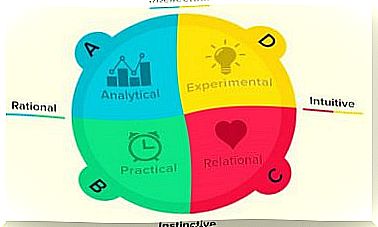Personality And Spirituality: How They Relate

Personality psychology is one of the greatest areas of study in psychology. Therefore, he has always tried to observe how our personality is formed, how it affects our behavior and how it conditions our way of seeing the world. Thus, the relationship between personality and spirituality has been increasingly studied.
Although the study of spirituality and religiosity is nothing new, a new branch has emerged in the last 20 years: the Psychology of Religiosity and Spirituality.
Among its objectives would be to clarify the relationship between personality traits and spiritual beliefs, how these evolve throughout the life cycle and the adaptive importance they have for certain personalities.
However, the main drawback that exists is reaching a consensus on what spirituality is and what religiosity is.
One of the most used definitions says that spirituality is an innate motivation that guides and guides behavior towards the construction of a broader personal meaning. That is, the belief that there is an order in the universe that transcends our thinking. In this sense, some authors propose that this could even form a personality factor by itself.
On the other hand, religiosity is the set of beliefs, values and practices explicitly guided by a social or institutional tradition, which depends on education and culture. Thus, religiosity is influenced by, and modulates, a person’s spirituality.

Personality
Even though there are several models that classify personality differently, generally the studies are based on the 5 Factors Personality Model. According to this model, personality can be defined as a function of the degree it presents in each of the following dimensions:
- Neuroticism : related to emotional instability and the tendency to experience negative emotions;
- Extroversion: tendency to be communicative and relate to others;
- Mental openness : tendency to show intellectual curiosity, imagination and aesthetic sensitivity;
- Kindness: related to the establishment of social bonds, altruistic attitude and interest in others;
- Responsibility: tendency to have clear purposes and goals, ability to control impulses and carry out tasks in an organized manner.
personality and spirituality
As we mentioned earlier, spirituality consists of an innate motivation and a belief that there is a universal order that determines our behavior.
Some researches have related spirituality with the 5 personality factors, such as extroversion, openness and kindness.
However, there are authors who argue that spirituality, by itself, includes nuances that should not include others (simplicity, detachment or solitude). Therefore, they consider that spirituality should be a sixth factor of personality.
Depending on the degree of spirituality that the person has, the person would show certain behavioral tendencies and ways of perceiving the world around them.
Religiosity and personality
Religiosity contextualizes a person’s degree of spirituality. Since spirituality is considered another personality factor, most studies have associated different personality traits with religiosity.
In this sense, even if approximately 60% do not find any relationship, there are signs that a greater religious spirituality is related to a greater presence of neuroticism.
On the other hand, 40% of studies indicate that people who are more religious show more traits of responsibility. In other words, a greater presence of goals and capabilities to achieve them in a planned and organized way.
In addition, 87% of surveys have found that people with a higher degree of religiosity are kinder. With regard to openness or the ability to have more imagination or curiosity, 42% of the studies found a positive relationship.
However, some authors believe that if the effects of spirituality are eliminated, that is, if they all present the same degree, greater religiosity would be associated with less openness.

Relationship between personality, spirituality and religiosity
One study analyzed the relationship between spirituality, religiosity and personality. He found that all personality factors, with the exception of openness, are related to the degree of spirituality. This result was more expressive in the areas of kindness and responsibility. However, religiosity was only associated with these last two factors.
More specifically, these studies observed that when the approach to religion happens due to a search for answers to existential questions, but the feeling of faith and spiritual meaning are low, religion is related to a high neuroticism and openness. On the other hand, religiosity was associated with low extroversion, friendliness and conscience.
Another finding was that when people approach a religion in a more instrumental way, either because it gives them security or becomes a source of socialization, but the intellectual pursuit and faith is low, there is a relationship with low levels of neuroticism, pleasantness and openness.









